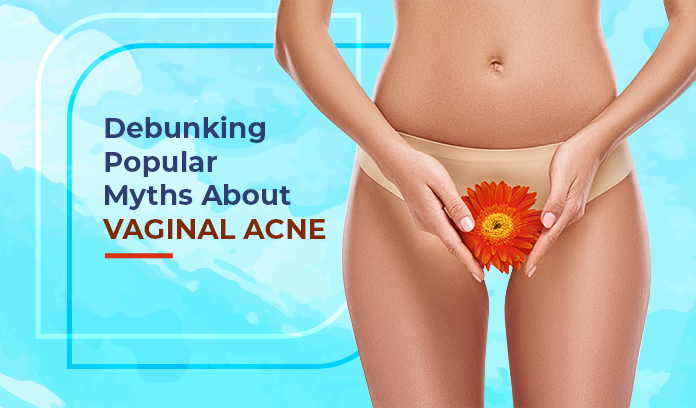While regular acne is widely dissected and talked about, vaginal acne is a topic often found uncomfortable to discuss and thus, remains shrouded in silence.
The lack of an open conversation has led to the development of several myths about vaginal health and vaginal acne.
In this blog, we aim to debunk some popular misconceptions and shed light on this sensitive topic.
Myth#1: Vaginal acne is the same as genital herpes
In reality, these are two separate skin conditions with distinctive differences. While vaginal acne is caused due to clogged hair follicles that may lead to painful acne bumps, genital herpes is a result of the herpes complex virus brought on by a viral infection that causes painful sores.
It is important to consult a healthcare professional for an accurate diagnosis to identify your condition.
Myth#2: Vaginal acne is caused by poor hygiene
Blaming the entirety of acne on poor personal hygiene is misleading as acne is caused by hormonal imbalances, excess oil secretion, and clogged hair follicles.
It can be harmful to over-cleanse or use harsh products on your sensitive area as it strips the skin of essential moisture.
While proper hygiene is crucial to maintain good health, it does not guarantee preventing acne breakouts.
Myth#3: vaginal acne is a rare condition
Research proves that acne inversa is a far more common occurrence than most of us care to admit. It is important to empower women to discuss this sensitive yet critical skin condition without feeling the shame of seeking medical advice.
Due to the sensitive nature of the topic, many refrain from discussing it in the open, leading to the perception of it being a rarity.
Myth#4: how to treat vaginal acne
Like other types of acne, it is quite possible to successfully treat vaginal acne with the right approach.
Topical or oral antibiotics, warm compresses, and breathable quality clothing can reduce the recurrence of many vaginal acne symptoms.
Remember to seek guidance from a healthcare expert to come up with a treatment plan most suited to your individual needs, as what works for one person may not work for another.
Conclusion
Vaginal acne is a sensitive issue that deserves open and informed discussions for women to make the right treatment choices.
It is important to debunk certain myths and misconceptions surrounding this condition as it requires thorough medical attention. It is possible to foster a positive environment that is conducive to those affected seeking medical help comfortably.
If you or anyone you know is suffering from vaginal acne symptoms, do not hesitate to seek a healthcare professional’s help for an accurate diagnosis and personalized treatment solutions.











